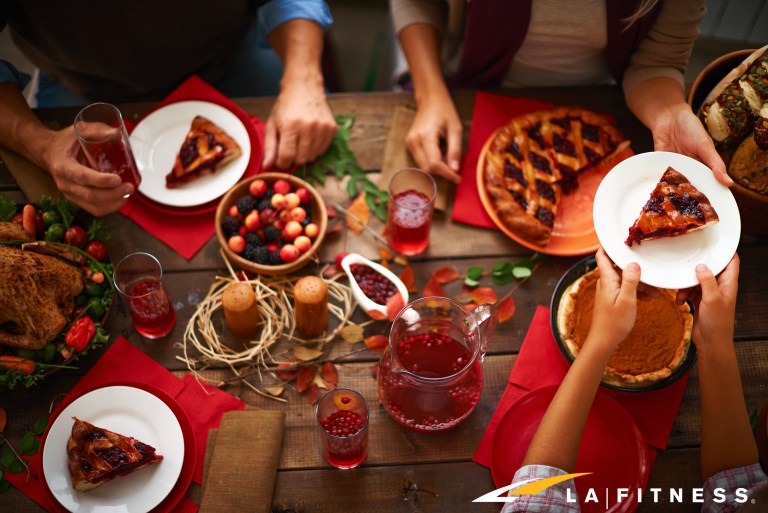Gaining Muscle with a Limited Diet
LA Fitness registered dietitian, Debbie James, gives a reader advice on how to gain weight with power-packed smaller portions.


Hi, I weigh 146 lbs. and have a small frame. I would like to put on muscle and get up to about 167 lbs. I am not a big eater and usually eat very small portions. I would like to know your recommendations for a diet.
– Sheldon S.

The situation you describe doesn’t leave a lot of room for options! I understand why you’ve reached out for advice. Increasing calories in a very limited volume can be quite challenging. Maximizing energy density can be done by 1) selecting rich foods, 2) through the addition of fats and sugars (Yep, you heard me say that correctly: fats and sugars), and by 3) power-packing.
1) Foods that are naturally energy-rich include nuts, nut butters, cheese, cream, oil, butter, dried fruit, nectars, traditional granola, tortillas, starchy vegetables, avocado, olives, coconut, bisque soups and chowders, salmon, beef liver, ice cream, and milkshakes. For packaged items, look for those that provide at least 300 calories per cup or 100 calories per ounce.
2) Anything that can be melted onto or into another food works! Ideas include cream in mashed potatoes, butter on noodles, pesto or avocado on sandwiches, cheese on casseroles, nut butter on toast, jam in yogurt, honey on fruit and mayonnaise on crackers. Nothing should be eaten plain if you are serious about gaining weight.
3) The concept of power-packing means to increase calories and protein without increasing volume. It involves replacing water content with higher calorie liquids. For example, fruit juice can be enriched by adding a cup of concentrate to each quart of liquid juice. For milk, add 2 Tbsp dry powdered milk to each cup fluid milk to gain 50 calories and 5 grams protein. Choosing oil-packed tuna over water-packed will give you over 100 calories more per 6 ounce can!
For meal and snack ideas, check out two sample weight gain menus from The University of Colorado, Colorado Springs.
Nutritional values obtained from the USDA’s National Nutrient Database for Standard Reference, Legacy Release. Findings were used along with RDN’s professional judgment.
– Debbie J., MS, RD
This article should not replace any exercise program or restrictions, any dietary supplements or restrictions, or any other medical recommendations from your primary care physician. Before starting any exercise program or diet, make sure it is approved by your doctor.
Some questions have been edited for length and/or clarity.
 Have a nutrition question? Our registered dietitian is ready to help!
Have a nutrition question? Our registered dietitian is ready to help!
Email nutrition@lafitness.com or submit your question below and it may be featured in an upcoming article!
LA Fitness registered dietitian, Debbie James, gives a reader advice on how to gain weight with power-packed smaller portions.
Try estimating your calorie needs with an online calculator from a reputable source that includes age, height, weight, gender and activity level.
It can be difficult to know exactly how many calories you burn each day, but keeping a food diary can give you an accurate number of how many calories you consume. Knowing your average daily calorie consumption is helpful if you are stuck at your current weight...


I’m reaching out to ask for guidance with nutrition. I’m having a very hard time losing weight. I have small kids, so I don’t get enough sleep and I can’t change that, but I’ve been doing a 1,200-calorie diet for 6 months with no results. Can I ask for advice in a very specific diet plan, something that can be written out for me for every meal and snack? I need someone to tell me exactly what to eat. I’ve tried going lower than 1,200 calories to see if weight goes down, but it doesn’t. I do not understand why I’m not losing weight when people around me diet and lose tons of weight in just a few months.
– Melanie

While we can’t give you a specific diet plan, I can offer you some suggestions.
First, it may be that 1,200 calories are too low for you and your body is trying to conserve. Keeping up with little ones burns a lot of energy! Try estimating your calorie needs with an online calculator from a reputable source that includes age, height, weight, gender and activity level.
Second, the quality of what you eat matters more than the caloric value. Choose unprocessed whole grains and produce, lean proteins and dairy, and healthy plant fats for your meals and snacks. Avoid sugary beverages and alcohol.
Also, how and when you eat can affect your body’s response to overall calories. Chew slowly and thoroughly to allow the proper satiety cues to reach your brain. Don’t skip meals or eat late at night.
Last, you can follow an array of sample menus to craft a week’s worth for yourself. Here’s a 1,200 calorie day and 1,500 calorie day to get you started.
Don’t forget to utilize your local LA Fitness club’s Kids Klub for less than the cost of an at-home sitter so you can get in a good workout stress-free.
– Debbie J., MS, RD
This article should not replace any exercise program or restrictions, any dietary supplements or restrictions, or any other medical recommendations from your primary care physician. Before starting any exercise program or diet, make sure it is approved by your doctor.
Some questions have been edited for length and/or clarity.
 Have a nutrition question? Our registered dietitian is ready to help!
Have a nutrition question? Our registered dietitian is ready to help!
Email nutrition@lafitness.com or submit your question below and it may be featured in an upcoming article!
LA Fitness registered dietitian, Debbie James, gives a reader advice on how to gain weight with power-packed smaller portions.
Try estimating your calorie needs with an online calculator from a reputable source that includes age, height, weight, gender and activity level.
It can be difficult to know exactly how many calories you burn each day, but keeping a food diary can give you an accurate number of how many calories you consume. Knowing your average daily calorie consumption is helpful if you are stuck at your current weight...

Debbie J., MS, RD contributed this article –
Though America is a melting pot of cultures and traditions, a common thread in the United States rings true: high-calorie foods are part of the holiday festivities this time of year. Take heed and reduce your portions or look for healthier alternatives to these calorie-laden favorites…if you want to fit into your clothes in 2016, that is.
Be the first to know about exclusive
content, deals and promotions